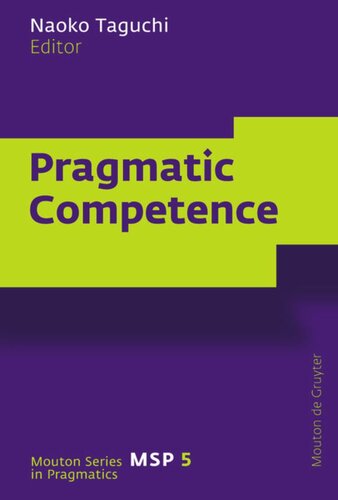

Most ebook files are in PDF format, so you can easily read them using various software such as Foxit Reader or directly on the Google Chrome browser.
Some ebook files are released by publishers in other formats such as .awz, .mobi, .epub, .fb2, etc. You may need to install specific software to read these formats on mobile/PC, such as Calibre.
Please read the tutorial at this link: https://ebookbell.com/faq
We offer FREE conversion to the popular formats you request; however, this may take some time. Therefore, right after payment, please email us, and we will try to provide the service as quickly as possible.
For some exceptional file formats or broken links (if any), please refrain from opening any disputes. Instead, email us first, and we will try to assist within a maximum of 6 hours.
EbookBell Team

4.1
20 reviewsIn the disciplines of applied linguistics and second language acquisition (SLA), the study of pragmatic competence has been driven by several fundamental questions: What does it mean to become pragmatically competent in a second language (L2)? How can we examine pragmatic competence to make inference of its development among L2 learners? In what ways do research findings inform teaching and assessment of pragmatic competence?
This book explores these key issues in Japanese as a second/foreign language. The book has three sections. The first section offers a general overview and historical sketch of the study of Japanese pragmatics and its influence on Japanese pedagogy and curriculum. The overview chapter is followed by eight empirical findings, each dealing with phenomena that are significant in Japanese pragmatics. They target selected features of Japanese pragmatics and investigate the learners' use of them as an indicator of their pragmatic competence.
The target pragmatic features are wide-ranging, among them honorifics, speech style, sentence final particles, speech acts of various types, and indirect expressions. Each study explicitly prompts the connection between pragmalinguistics (linguistic forms available to perform language functions) and sociopragmatics (norms that determine appropriate use of the forms) in Japanese. By documenting the understanding and use of them among learners of Japanese spanning multiple levels and time durations, this book offers insight about the nature and development of pragmatic competence, as well as implications for the learning and teaching of Japanese pragmatics. The last section presents a critical reflection on the eight empirical papers and prompts a discussion of the practice of Japanese pragmatics research.